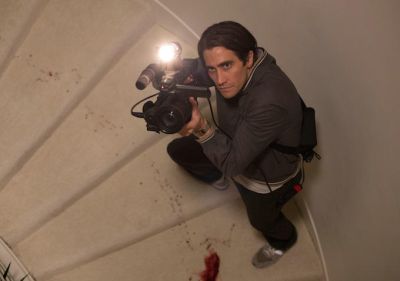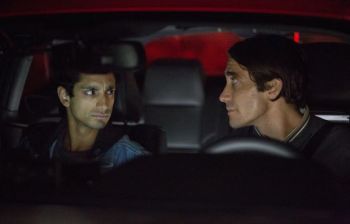
By Matthew Sorrento.
He can “work all day, and creep all night,” stated Dr. James Grigson, nicknamed Dr. Death (for his penchant for sending the accused to the chair) about Randall Adams, the man wrongfully accused for the murder of a Dallas policeman featured in Errol Morris’ exemplary documentary The Thin Blue Line (1988). Grigson’s diagnosis shows humanity’s need to exorcise the desire for transgression onto others, here persecuting a “drifter” to ease hysteria over a cop-killing. As with Dr. Henry Jekyll, the desire is something we’d like to transfer to a night-walking alter ego. Jake Gyllenhall’s role as Lou Bloom in Nightcrawler, a probing, satirical black-comedy, is a personification of the disowned demons we should face. The film features a script David Fincher would have liked to have seen, direction Michael Mann couldn’t have visualized better, and an effect suitable for David Ayer (as the Hyde counterpart to his gritty 2012 policier, End of Watch, starring a buffer Gyllenhaal). Nightcrawler‘s the writing-directing debut of screenwriter Dan Gilroy.
 To borrow a phrase from Wheeler Winston Dixon’s Visions of the Apocalypse (2003), we are under the “Tyranny of Images,” not just of those made by others, but the more imposing ones self-created on impulse. It’s the age of pull (from the pocket) and shoot, whenever, wherever – a new act for the term “snapshot” which Robin Williams’ Sy, in Mark Romanek’s bleak, photo-visual satire One Hour Photo (2002) reminds us, was originally a hunting term. “Selfie” – the term itself – invokes selfishness growing from the technology disposable to us, often at the expense of others: the sickening American fad of rich teens snapping selfies in front of the homeless is proof enough. Nightcrawler, featuring one who lurks at night to gather crime footage for broadcast (with no care for anything in his way), parodies such obsession and notes it to be a tragedy of our times.
To borrow a phrase from Wheeler Winston Dixon’s Visions of the Apocalypse (2003), we are under the “Tyranny of Images,” not just of those made by others, but the more imposing ones self-created on impulse. It’s the age of pull (from the pocket) and shoot, whenever, wherever – a new act for the term “snapshot” which Robin Williams’ Sy, in Mark Romanek’s bleak, photo-visual satire One Hour Photo (2002) reminds us, was originally a hunting term. “Selfie” – the term itself – invokes selfishness growing from the technology disposable to us, often at the expense of others: the sickening American fad of rich teens snapping selfies in front of the homeless is proof enough. Nightcrawler, featuring one who lurks at night to gather crime footage for broadcast (with no care for anything in his way), parodies such obsession and notes it to be a tragedy of our times.
In his early essay “Obsessive Actions and Religious Practices,” Freud theorizes compulsions to be the root of religious ritual. Bloom develops such a compulsion (and reverence) for recording images and sound, after realizing that the footage is a commodity. The film begins, true to its title (at night), with Bloom busted while attempting to rip off chain-link fencing for metal scrap (a legitimate problem in American cities). He attacks the security officer, after noting his unofficial uniform, in a move that’s as effective as it is cold. After selling the metal, he proposes to work for the scrap yard. His pitch for work is as even and emotionless as his previous attack; his motive is to steal for the boss, less than work legitimately. (The film’s potential to delve into maudlin recession-age anxiety is squashed before our eyes.) After the rejection, he witnesses an accident and a camera crew drawn to the scene, seemingly from the nearby shadows. The cameraman reels in the commodity before Bloom’s eyes, Bloom seeing something he could snatch and sell easier than metal. He then lifts a bicycle by daylight and, at a pawn shop, exchanges it for a cheapo camcorder and a police radio.
 The use of media, to invoke the nature of looking, in crime films in nothing new, especially when considering the element in Antonioni’s Blow Up (1966); DePalma’s tribute to the ’66 film, Blow Out (1981); and Coppola’s The Conversation (1974), which notes that possessing (i.e., recording) all the information is knowing too much. While Harry Caul’s (Gene Hackman) audiotapes reveal greater fear in the man, Bloom’s footage thrills him during the acquisition (at night), the sale for broadcast (early morning), and reviewing the broadcast (by day, when he’s homebound, true to his vampiric nature – perhaps a true case for Grigson’s assessment, once Bloom crosses the line). He repeats the routine, not unlike an obsessive American football coach running gametape, or hey, a budget film crew running dailies.
The use of media, to invoke the nature of looking, in crime films in nothing new, especially when considering the element in Antonioni’s Blow Up (1966); DePalma’s tribute to the ’66 film, Blow Out (1981); and Coppola’s The Conversation (1974), which notes that possessing (i.e., recording) all the information is knowing too much. While Harry Caul’s (Gene Hackman) audiotapes reveal greater fear in the man, Bloom’s footage thrills him during the acquisition (at night), the sale for broadcast (early morning), and reviewing the broadcast (by day, when he’s homebound, true to his vampiric nature – perhaps a true case for Grigson’s assessment, once Bloom crosses the line). He repeats the routine, not unlike an obsessive American football coach running gametape, or hey, a budget film crew running dailies.
Like the famous crime scene photographer, Weegee (an inspiration to the early photography of Kubrick, who had him do set photos on Dr. Strangelove; according to Peter Sellers, the old-time Nightcrawler inspired the voice of the title character), Bloom beats the cops to the scenes. He comes so close to accidents and crimes that he appears to be fueled by their severance of normalcy, the thrill of transgression. A social outcast, he finds his place, what David Mamet’s Edmond learns from a fortune-teller, in the opening moments of that play and film (by Stuart Gordon, 2005), that he is distant from, yet never finds.
Bloom brings into the endeavor an underling, played by Riz Ahmed (Four Lions, 2010), doing what seems like an aloof Mark Ruffalo impression that’s just right. Not much more is needed; now an agent of Death, the new hire must live by it or succumb to it. Bloom begins to recite eerie bureaucratese to his employee in the same tone the former pitched at the metal plant. Exploitative and egotistical – and yet something like the data coming from that sublime unhewn log, Being There’s Chance the Gardener – Bloom’s speeches grow funnier as the film progresses, alleviating a heavy tone, while we accept Ahmed’s character as a foil in the melodrama.
 Gilroy shows a fine sensibility, in the script and on screen, and yet Gyllenhaal is at the heart of the success. For years the actor presented himself as a budding naturalistic performer, basically Jake from down the street doing a love interest, a gay cowboy, a Prince of (a video-game’s take on) Persia. Much of the performance strength in Brokeback Mountain (2005) came from the pairing of the relaxed Gyllenhaal and Heath Ledger, who transformed himself into a piece of Bush-era repression (doing an expressionist Joker later was a shoe-in). Now Gyllenhaal transforms himself, via not only severe weight loss, like his former co-star Ledger into one so socially awkward that he’s grows sociopathic. That Bloom (true to his name) comes of age, as a major success in the mainstream TV news, more so highlights that media which drives consumerist satisfaction sucks the blood from all of us.
Gilroy shows a fine sensibility, in the script and on screen, and yet Gyllenhaal is at the heart of the success. For years the actor presented himself as a budding naturalistic performer, basically Jake from down the street doing a love interest, a gay cowboy, a Prince of (a video-game’s take on) Persia. Much of the performance strength in Brokeback Mountain (2005) came from the pairing of the relaxed Gyllenhaal and Heath Ledger, who transformed himself into a piece of Bush-era repression (doing an expressionist Joker later was a shoe-in). Now Gyllenhaal transforms himself, via not only severe weight loss, like his former co-star Ledger into one so socially awkward that he’s grows sociopathic. That Bloom (true to his name) comes of age, as a major success in the mainstream TV news, more so highlights that media which drives consumerist satisfaction sucks the blood from all of us.
Matthew Sorrento is Interview Editor of Film International. He teaches film at Rutgers University in Camden, NJ and is the author of The New American Crime Film (McFarland, 2012).
